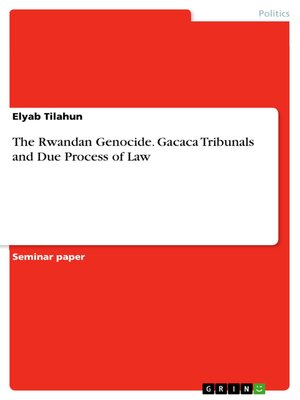
Sign up to save your library
With an OverDrive account, you can save your favorite libraries for at-a-glance information about availability. Find out more about OverDrive accounts.
Find this title in Libby, the library reading app by OverDrive.



Search for a digital library with this title
Title found at these libraries:
| Loading... |
Seminar paper from the year 2011 in the subject Politics - Topic: Public International Law and Human Rights, grade: A-, , course: Law, language: English, abstract: The atrocities that occurred in Rwanda have been the issue of the international community for some time now. Books have been written about the evils of the genocide that occurred there. Scholars have had their share of debates and arguments about the issue. Newspapers, government reports and human right organizations have made it their headlines in different events. But after all that has been unfolded in Rwanda, all that was left was over 100,000 suspects and more than a million dead corpses. The government of Rwanda had to devise a system to deal with all those suspects, thus bringing forward a traditional conflict resolving mechanism called the Gacaca tribunals. These tribunals were established in every community and were mandated to address genocide related issues and deal with the suspects. They were also established on the belief that they would bring about transitional justice and reconciliation within the society. These and other factors aside, the tribunals were often criticized for lacking the proper due process aspects of dealing with suspects. The main focus of the paper is to discuss thoroughly these issues and analyze the tribunals on this basis.






